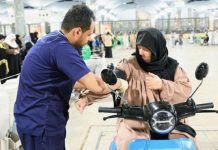Glasgow, Feb. 4 (TNS): A Pakistan-origin Scottish politician has called for the government and public to accept that “everyday Islam phobia” is a direct threat to Muslims, after claiming he was unsuccessful in his bid to lead the Scottish Labour Party because of “insidious” racism.
Member of Scottish Parliament (MSP) Anas Sarwar, who was born in Glasgow to Pakistani parents, secured just 43 percent of the vote in November last year, losing the race to Richard Leonard.
Sarwar recently alleged that a senior Labour councillor, Davie McLachlan, told him he refused to vote for the 34-year-old because Scotland was not ready for a “brown, Muslim Paki”.
When Sarwar questioned the use of McLachlan’s racist language, the councillor dismissed the comment as “pub banter”.
McLachlan, who denies the allegations, has been suspended from the party awaiting investigation.
Sarwar also claimed that another party member withdrew her support from his campaign after seeing photographs of his wife, Furheen, wearing the hijab, or headscarf.
“Just as we have everyday sexism, everyday homophobia, we also have everyday racism and everyday Islamophobia, too,” Sarwar said in an interview with Al Jazeera, explaining that he recently launched a cross-parliamentary group tackling anti-Muslim racism.
“One of the challenges as an ethnic minority politician, as a Muslim politician, has been being honest about [racism]. In our drive to be accepted, our drive to be seen as equal or normal like everyone else, we have been shy in speaking about everyday racism and Islamophobia.”
The politician said it would take “a great deal” to consider running for party leadership again, given his traumatic experience.
“But what it has encouraged me to do is to stand up and speak about it,” he said. “My children know what racism is. They know what Islamophobia is. They experience racism and Islamophobia. I owe it to them and their generation to make sure that when they are my age, they can see that in that 20 or 30 years we have made progress. If we don’t, then we will have failed them.”













